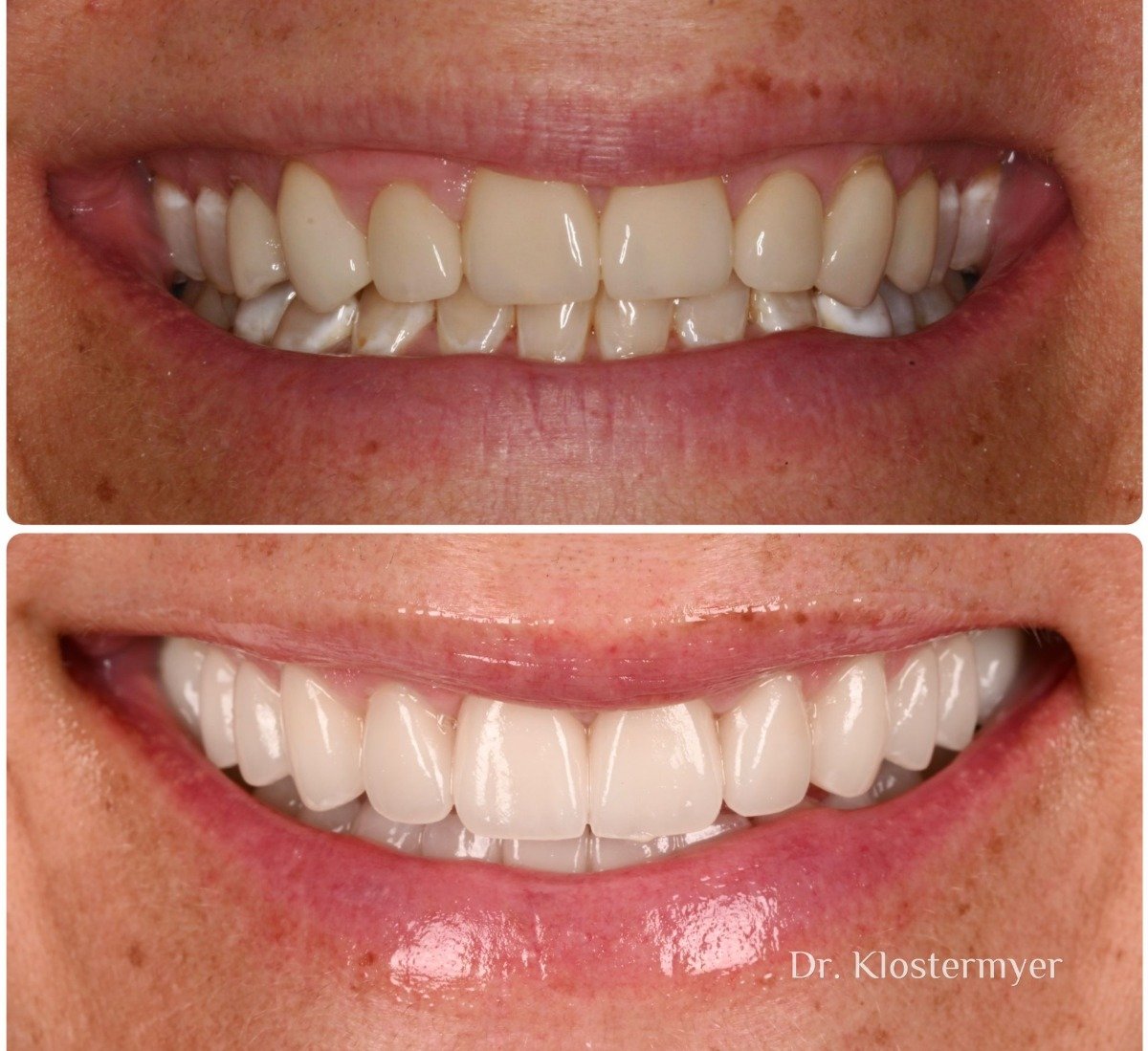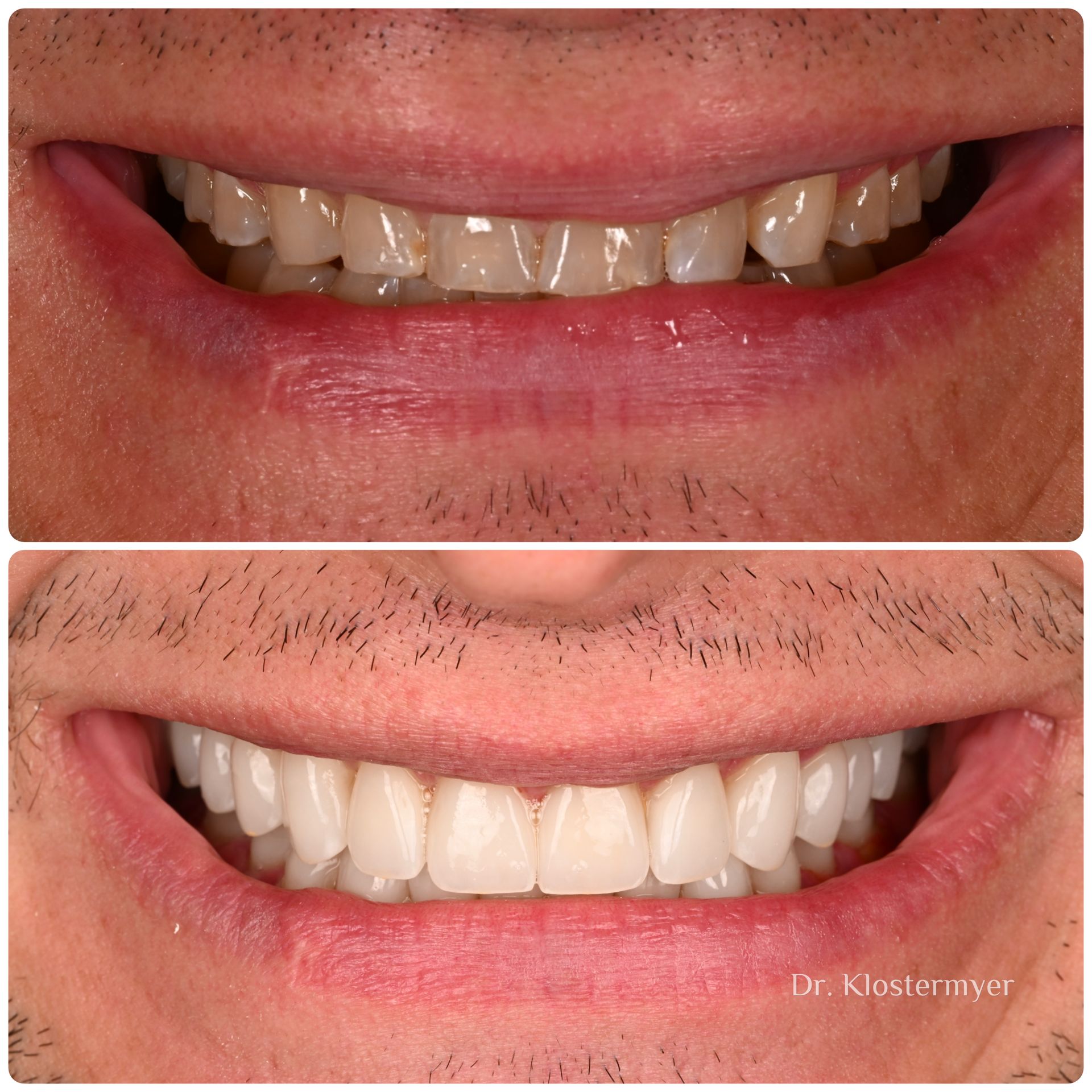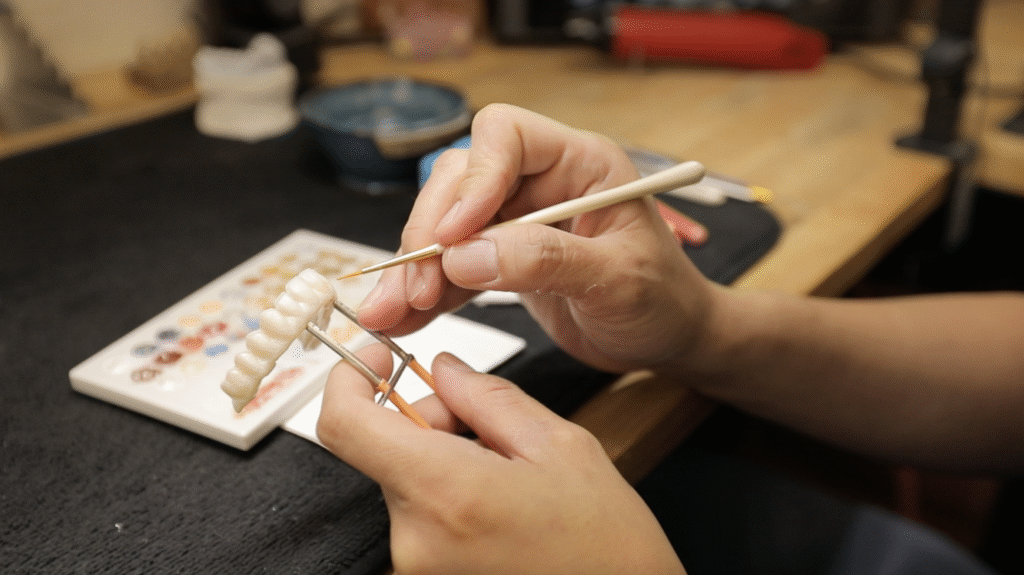What are porcelain veneers?

Dental veneers—also called porcelain veneers or porcelain laminates—are ultra-thin, custom-crafted shells of tooth-colored ceramic. They are designed to cover the front surface of teeth to improve the appearance of a smile. All of our dental veneers are custom-fabricated for each tooth and each person. They are made of high end porcelain or resin composite to enhance tooth color, shape, size, or length.

Types of porcelain veneers
- Feldspathic Veneers (Contact Lens Veneers):
Known for their ultra-thin design, feldspathic veneers are ideal for patients seeking subtle, natural refinements in tooth shape or color. This type of porcelain is best suited for individuals with healthy bite function who desire long-term, minimally invasive improvements. - Lithium Disilicate Veneers (e.max, Amber Press):
These high-strength all-ceramic veneers are recommended when additional durability is required—such as in patients who have had veneers in the past, or in cases involving bite adjustments and restorations of the back teeth.
Dr. Franziska Klostermyer’s approach
Dr. Franziska Klostermyer devotes her practice to the art and science of veneers, traveling between Miami, Florida, and Richmond, Virginia to provide patients with exceptional care. She collaborates closely with the world’s leading master ceramists to create veneers that blend seamlessly with each patient’s unique features.
A significant portion of Dr. Klostermyer’s work is dedicated to revision cases. These patients often come to her with existing veneers—sometimes many years old and showing signs of wear, discoloration, or outdated techniques—or with more recently placed veneers from other offices that do not meet their aesthetic expectations. Whether the concern is an unnatural appearance, poor color matching, bulkiness, or a lack of harmony with facial features, Dr. Klostermyer is trained in correcting and elevating these results to create smiles that look natural, refined, and timeless.
Her philosophy centers on creating veneers that not only look beautiful but also function harmoniously for long-term health and confidence.




Dr. Franziska Klostermyer’s master ceramist layering custom porcelain
Frequently asked questions
Veneers are bonded to the front of the teeth and can only be removed by your dentist.
Porcelain veneers resist stains better than resin veneers. They better mimic the light reflecting properties of natural teeth. They are fabricated at a dental laboratory, which requires work and time. Resin veneers made chairside, are less cost-intensive but less durable.
There are several factors that contribute to natural looking aesthetically pleasing veneers. Some considerations one may have are:
- What is your dentist’s ability to color match the veneers with your other teeth and your facial features?
- We have all seen someone with conspicuously perfectly restored teeth. Why do they look so artificial? Are they too perfectly shaped? Do they have a natural translucency? Are the teeth too white for the person’s age?
- Were the impressions taken precisely, including areas just below the gumline?
- Was a master ceramist used to fabricate the veneers?
With the many years of experience and the utilization of high quality materials, choosing Advanced Dentistry of Richmond will lead to a custom, natural and aesthetic outcome.
There are a variety of reasons to recommend porcelain veneers. One common reason includes severely stained or discolored teeth. Also common are teeth showing gaps, chips, wear, irregular shape or short length. Veneers provide a natural, aesthetic appearance and boost patient confidence.
Surface preparation is necessary for teeth to accept dental veneers. This involves the removal of about half a millimeter of the natural tooth enamel. Removal allows space for the thickness of the veneer. Following surface preperation, the dentist makes an impression of the prepared tooth. A trained dental technician then uses the impression to prepare a cast. From the cast, the technician fabricates the custom veneer. During a follow-up visit, the dentist fits and bonds the veneers to the teeth.
The media promotes little or no-prep veneers. These so called Lumineers are veneers that are even thinner than porcelain veneers. They don’t work in all cases, can be less stable and cause gum inflammation because they are thicker than the prior tooth structure.
Dental veneers are stain resistant. They provide a natural tooth appearance and are very compatible with gum tissue. Porcelain veneers can be accurately color matched to existing teeth. Lighter shades of white are optional. Veneers are a conservative approach to changing a tooth’s color and shape. In contrast to a crown, they preserve much of the tooth’s original substance.
Dental veneers are less invasive and require less removal of natural tooth material in comparison to crowns. They require the removal of a thin layer of enamel to achieve a natural look and adequate bonding surface. This is a non-reversible process. It may make the underlying tooth more sensitive to hot and cold beverages. Veneers cannot be whitened with an oral bleaching agent. Teeth whitening must occur before placing veneers.
Those with fractured teeth or very large fillings, may not be good candidates for veneers. Doubtful candidates include those with little tooth enamel or teeth grinders. Anyone who chews on hard objects, fingernails, pencils, or ice, may experience complications. Those with gum disease should review options with their dentist before choosing veneers.
According to the ADA veneers generally, last between 10 and 15 years. Maintenance or replacement is required within this interval but depends greatly on how they are cared for. Regular cleanings and custom made night guards are the best ways to protect the porcelain and underlying dentition.
Dental veneers do not need any special care. Simply practice good oral hygiene practices such as brushing and flossing.
